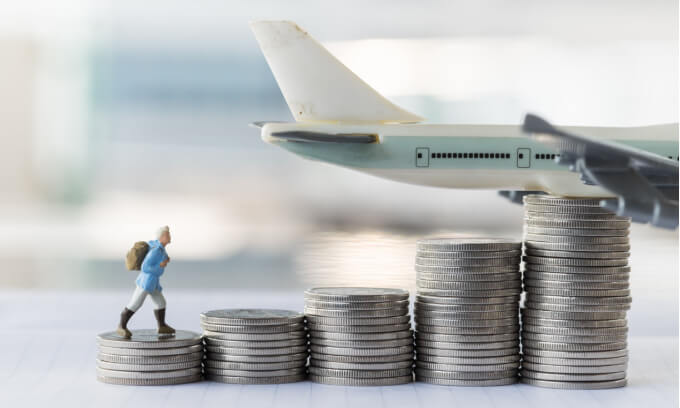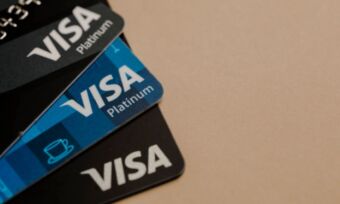Travel money cards vs credit cards vs debit cards
For Australian travellers, three of the most popular ways to manage spending abroad are travel money cards, credit cards, and debit cards. But with so many options available, which one is the best for your trip?
We’ve considered the options that may be available to you, and the pros and cons of each method.
Travel Money Card
With a travel money card, you can preload a foreign currency to use overseas, as you would a debit card. Some cards only allow one currency to be added, while others permit multiple currencies. They can then be used internationally for in-person or online shopping, or to withdraw cash at ATMs.
The currency conversion is calculated using the exchange rate at the time you preloaded the money onto a travel money card, so this may be a factor in deciding when to load the card up.
What are the pros of travel money cards for travel?
The potential pros of travel money cards include the ability to lock in your exchange rate, load multiple currencies onto the one card and have more control of your spending.
- Exchange rate locking: When you put funds onto a travel money card, your exchange rate is locked at the time the funds are loaded, meaning you won’t need to worry about fluctuating exchange rates once you get to your destination. Some cards allow ‘top ups’ (adding money to the card) while travelling, in which case the exchange rate would be applied at the time of the ‘top up’.
- Ability to load multiple currencies: Some travel cards allow you to upload up to 13 currencies onto the one card, which is convenient if you plan on travelling to multiple destinations, as you won’t need to keep exchanging currency.
- Avoid multiple currency conversion fees: If you use a credit or debit card while travelling, your bank may charge you currency conversion fees for each transaction. With a travel card, your funds will already be in the currency of the country in which you are travelling, so this may be avoided.
- Greater control of your spending: Once you’ve loaded a certain amount of money onto a travel money card, you may be able to set your budget more confidently, knowing how much money you have access to, potentially limiting the temptation to overspend.
What are the cons of travel money cards for travel?
There are certain things to be aware of when it comes to travel money cards. These can include unfavourable exchange rates, extra fees and charges, and long wait times to transfer money.
You may also want to be mindful about pre-authorisation, which could restrict where you can use the cards and when you have access to your funds.
- Fees and charges: In general, there can be numerous fees associated with travel money cards. These could include fees for:
-
- purchase and issue of the card
-
- loading and reloading currency
-
- cashing out the balance of the card
-
- withdrawing funds at ATMs
- Long load times: When you transfer money to a travel card, the lead time for the funds to appear can vary widely. In some cases, it can take up to three days for the funds to become available, so you’ll need to plan ahead by transferring money several days in advance.
- Limited pre-authorisations: Some services such as hotels and hire car companies use pre-authorisation when you book. This means putting a specified amount of funds on ‘hold’ in advance of the actual purchase being made. Some merchants may not accept travel money cards for this purpose, and may require a credit card instead.
- Funds being put on hold: Even if your merchant does accept travel cards for pre-authorisation purposes, the ‘hold’ placed on funds can last for several weeks. This means that even after payment for your hotel stay or hire car is debited from your travel card, you may be delayed in accessing your funds.
Credit cards
Credit cards allow you to borrow money from a financial institution to pay back at a later date, typically with interest.
Depending on the type of card, you may be able to use your credit card overseas. For example, Visa and Mastercard credit cards are widely accepted worldwide.
Some banks also include extras like international travel insurance, frequent flyer points, cashback offers and interest-free periods on their credit cards rewards programs, which you may want to consider when choosing a credit card for travel.
It’s important to remember money spent on a credit card is a form of debt that you’ll need to repay according to the lender’s rules. Depending on the card and how you use it, you may be required to pay additional costs like fees and interest.
What are the pros of using credit cards for travel?
The potential pros of using credit cards for travelling include greater convenience, flexible budgeting, low pre-authorisation time, and some of the extras that lenders can throw in, such as travel insurance.
- Credit cards are widely accepted: An advantage of credit cards is that they are widely accepted overseas. For example, you can likely use the same Visa or Mastercard you use in Australia on your travels, as most vendors will accept these cards in a wide variety of locations. You may need to check if your vendor accepts cards such as Amex, and if there are any additional fees for this.
- Potential for a more flexible budget: Depending on the limit of your credit card, you may be able to travel with a more flexible budget, and if any unexpected surprises or expenses arise, you will not need to deplete your cash reserves to pay for them. But this would also include taking on extra debt that has to be repaid, as using a credit card is a type of debt.
- More convenient pre-authorisation: Many providers such as hotels and hire car services prefer taking pre-authorisation payments on a credit card, and in general terms, the turn-around time for pre-authorisation payments is shorter with a credit card. The funds may only be on hold for up to a week (depending on your provider and the merchant), where a debit card may put them on hold for several weeks.
- Availability of extras: Some credit cards come with extras that are tailored towards travellers—they may come with travel insurance included, for example, or they may offer interest-free days, frequent flyer points, cashback and other deals with participating merchants, and even perks like flight upgrades. It may even be the case that your existing credit card has some features that could be useful for travellers.
What are the cons of using credit cards for travel?
While credit cards can offer convenience when making purchases internationally, it’s worth keeping in mind some of the possible downsides such as currency conversion and international transaction fees, the potential for higher annual fees, and the temptation to spend up to your credit limit.
- Currency conversion fees: One thing to be aware of when using credit cards internationally is currency conversion fees. You may be charged a percentage of the transaction cost on top of the exchange rate, which could be as high as 3% or more. It may be worth checking with your card issuer to see if these fees can be waived, or applying for a card with no currency conversion fees.
- International transaction fees: While most credit cards come with the ability to spend money internationally, many will still charge you international transaction fees, which can get as high as 3% or more. While credit cards can be convenient when making purchases internationally, it is important to keep these fees in mind when making transactions.
- Temptation to spend available funds: While the flexibility of a credit card can be convenient, It’s important to be aware of the potential temptation to overspend. With a credit card, you may spend more than you had budgeted for by spending up to your credit limit, which could be much higher than your intended spending limit for the trip. It’s important to remember that the money you spend on a credit card will always need to be paid back, sometimes with interest.
- Higher annual fees: While some credit cards come with features that are tailored towards travellers, these cards may come with higher annual fees attached. For example, if a card offers no international transaction fees, it may be the case that the annual fees you’ll pay will be higher than the amount you would have paid in those types of transaction fees. Considering whether the benefit of the added features outweighs the cost in annual fees.
Debit cards
A debit card allows users to access their savings to make purchases, instead of using cash.
When travelling internationally, a debit card may be an accessible option, as you are likely to already have an everyday bank account you use for transactions. Such accounts are typically managed via apps or digital wallets on your phone, and you can also have a physical card attached, which can be used for payments and withdrawing cash from ATMs.
Before jumping on the plane, it’s advisable to check with your provider whether your debit card can be used to access funds internationally, and also to notify them that you will be travelling, for security reasons.
What are the pros of using a debit card for travel?
Some potential pros of using a debit card while travelling could include the fact that they are widely accepted, have the potential for cheaper ATM access, and could allow you to access all your funds in the case of an emergency.
- Debit cards are widely accepted: Much like credit cards, debit cards tend to be linked to providers such as Visa and Mastercard, making them widely accepted by merchants around the world, which means that using them can be convenient.
- Potential for cheaper ATM access: In general terms, international ATM access can be cheaper with debit cards than credit cards if you need to withdraw cash, particularly if your provider has a partnership with an international ATM network. Check with your financial institution.
- Access to all your money: If you have a debit card with you, then you will have access to your full savings, which could potentially be useful in an emergency situation or if you find yourself unexpectedly in need of cash.
What are the cons of using a debit card for travel?
Possible downsides of debit cards for travel include international transaction and currency conversion fees, the potential that some merchants may not accept them for pre-authorisation purposes, and the possibility that, even if they do, your funds may end up on hold for an unexpected period of time.
- International transaction fees: As is the case with credit cards, if you plan on using a debit card for everyday transactions, you may be charged transaction fees. However, some providers may offer an account that does not charge these fees, or waive them under certain circumstances. You may also be charged currency conversion fees by your provider if paying with a debit card.
- Limited pre-authorisations: Similar to travel money cards, some merchants may not accept debit cards for pre-authorisation purposes.
- Funds being put on hold: Likewise, even if your merchant does accept debit cards, you may find that the ‘hold’ placed on funds can last for several weeks. This means that even after payment for your hotel stay or hire car is debited from your debit card, you may be delayed in accessing your funds.
Cash
While physical currency has declined in popularity – there are still some situations when it may be beneficial to have foreign currency on hand, depending on your destination and how you plan to manage your money.
What are the pros of using cash when travelling?
While cash may be increasingly outdated in today’s world, there may be some situations in which travelling with it could be beneficial. There are some economies that still rely on physical currency. You may also find that travelling with cash could help you stick to a budget and avoid exchange rate fluctuations and fees.
- Some countries still rely on it: In some cases, travelling with physical local currency may be the most convenient option, given that some countries are still heavily reliant on cash. According to Merchant Machine, you may well find that a high proportion of transactions are still made in cash in destinations such as Peru and Vietnam. Romania is the nation with the highest proportion of cash usage in the world, while Egypt, Kazakhstan, Bulgaria and Ukraine make up the top five.
- Avoiding fees and exchange rate fluctuations: If you exchange your cash at a favourable rate, you won’t be affected by fluctuating exchange rates and currency conversion fees as you would be if you were making frequent transactions on a card where these fees are not fixed.
- Setting a budget: If you wish to set a particular budget for your trip, then travelling with cash might be one way to help you stick to it, as you may be less tempted to overspend. Even then, it may be worthwhile to travel with a card or with access to funds digitally for emergencies and situations where cash is not accepted.
What are the cons of using cash when travelling?
There are a number of potential drawbacks to travelling with cash, including the possibility that you may end up locked into an unfavourable exchange rate, the reluctance of merchants to accept cash in this day and age, and the overall lack of security that is part and parcel of physical currency.
- Getting an unfavourable exchange rate: If you are planning to use cash as your primary currency on your trip, you may find that when it comes time to exchange your money, exchange rates are unfavourable. This means you could end up with less money than what you had hoped for, and you will not be able to take advantage of a more favourable exchange rate if it improves during your trip.
- Reluctance to accept cash: During the COVID-19 pandemic, many retailers moved away from cash transactions towards contactless and card payments, to limit the handling of physical money. As a result, many retailers may still be reluctant to accept cash, or may state that they prefer card transactions.
- Cash is rare in some destinations: While cash is still commonly used in some economies, it is relatively rare in others. For example, according to Merchant Machine figures, only 3% of transactions in Norway are made in cash.
- Lack of security: If you lose a card overseas or if you fall victim to theft, you may well have the opportunity to call your issuer and cancel it, and have access to your funds restored. If you lose cash or if it’s stolen, then you will likely have no backup, meaning that cash presents a security risk, especially in larger amounts.
If you’re planning a trip and would like to consider your options, you can always check out Canstar’s Travel Credit and Debit Cards Star Ratings for some cards that offer value to Aussie travellers.








